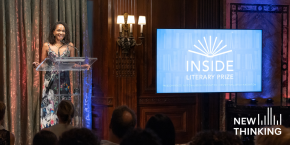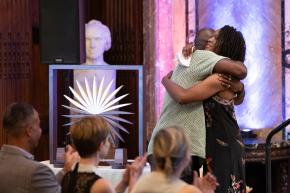
A brief, moving excerpt from the recent award ceremony at the New York Public Library announcing the inaugural winner of the Inside Literary Prize, the first major U.S. book award to be judged exclusively by people who are incarcerated.

Hear from Freedom Reads founder and CEO Reginald Dwayne Betts, and from this year’s winner…
The following is a transcript of the podcast:
Matt WATKINS: Welcome to New Thinking from the Center for Justice Innovation. I’m Matt Watkins.
Just a brief podcast extra today, to announce here the winner of the inaugural Inside Literary Prize.
In the background, you’re hearing folks gathering for the award ceremony. It took place recently at the New York Public Library.
I hope you’ve heard our most recent episode from inside Shakopee women’s prison in Minnesota, documenting some of the judging for this prize.
The Inside Literary Prize is the first major U.S. book award judged exclusively by people who are incarcerated.
It’s a shared project of Freedom Reads, the National Book Foundation, the Center for Justice Innovation, Lori Feathers, and above all, the more than 200 judges who participated this year in prisons across this country.
There were four nominated books: Tess Gunty’s novel, The Rabbit Hutch; Roger Reeves’ book of poems, Best Barbarian; Imani Perry’s South to America: A Journey Below the Mason-Dixon to Understand the Soul of a Nation; and Jamil Jan Kochai’s collection, The Haunting of Haji Hotak and Other Stories.
To keep this podcast extra brief, we’re only going to feature remarks from the winner of the prize. But I want you know first that all of the nominees spoke passionately about the meaning of this prize for them. And I think there was a collective sense that this prize really isn’t about an individual winner. It’s about the people who did the reading, and about the humanity and the potential of all of the almost two million people currently behind bars in this country.
Reginald Dwayne Betts, the founder and CEO of Freedom Reads, was the MC for the event. You’re going to hear two edited excerpts of his remarks, followed by the acceptance speech of the prize winner.
One note: you’ll hear Dwayne reference the winner receiving an award of $4,860. That is the amount Dwayne received over five years of work when he was incarcerated, working in the prison library at $0.54 an hour.
Here’s Dwayne.
Reginald Dwayne BETTS: Thank you guys for coming. My name is Reginald Dwayne Betts, And you are all here for the Inside Literary Prize. By way of announcement, I just want to say that this is a remarkable occasion. We have a standing room only audience.
One of the ways that you show that you care about people is to allow them to have an active part in civic engagement. And if you choose to decide that people in prison don't matter, that you are choosing maybe to argue that redemption is impossible.
This literally was impossible without a thousand people. I am just fortunate to be standing up here, but there are so many people involved. People who are serving life in prison, who committed themselves to read four books in a completely abridged amount of time and make themselves vulnerable.
There are people on our team who have never been in a prison before, and went into a prison, time and time again, waiting sometimes hours to enter. And you leave weeping. Because if you leave a prison without tears, maybe you weren't paying as much attention as you might.
(end of excerpt 1)
BETTS: One of the things you have to actually ask yourself is: what truly is the function of literature? And you have to ask yourself if you understood the function of literature before a day like today. Being comfortable, I think, allows you to forget the discomforted.
And today we got to get a close look at how literature comforts those who are in need of comfort, and how it asks us to think differently about what our lives might become.
1997, I got sent to the Fairfax County Jail—I was 16 years old. It's devastating for me now, because my son is 16 and my son weighs maybe 120 lbs., and he weighs more than I did when I was sent to the Fairfax County Jail. And I was placed in solitary confinement.
For nine days, I had not a mattress, not a blanket, not a pillow, not a sheet. I had a concrete slab to sleep on, and I was 16 years old. Nine days later, the nurse came to make sure I was healthy to send me to general population, and the nurse realized that I smelled like a 16-year-old who hadn't taken a shower in nine days.
The nurse demanded that the COs give me my property, and they brought me my property. And the thing that delighted me most was James Baldwin's short story collection. I read the whole thing in one night.
Baldwin once wrote an essay to prisoners, and he talked about the creativity that was locked inside of a cage. And he talked about the possibility. But what Baldwin also talks about, in one of the most amazing languages ever produced in the English language, in Notes of a Native Son, was how violence destroys.
And a violence that destroys isn't just a violence that's enacted by the hands of your oppressor. But the violence that destroys is also the violence that's enacted by your hands.
And I like to think that one of the most humbling things about this tour, about doing this work with men and women in prison who understand what it means to have regrets, is that the literature made each of them understand those regrets in a much more profound way.
And I think made us, seriously understand their humanity, understand our own humanity in ways that we don't often contemplate. And so I want to say that the winner will receive $4,860. Buys a lot of soups in prison. But that represents 1,800 hours at $0.54 an hour.
A friend of mine, I sent him a Imani Perry's book, and His response was to start a book club. I told him about this prize, and he was disappointed that Virginia was not amongst the states that would be judges.
When I tell him that the winner of the first Inside Literary Prize is Imani Perry, he'll be delighted. Not just because he's read your work, but because he read your work before you wrote about the life that you've lived and about some of what inspires your work. And it is a delightful honor to invite you to the stage to accept the first Inside Literary Prize.
Imani PERRY: Oh, wow. God, I wish my daddy was alive. Thank you. I wrote something, because my children told me I always got to be prepared.
I remember the envelope stamped with the names of correctional facilities. And then the long letters in tight script written on yellow loose leaf paper that sat on my father's desk. He wrote long letters back, his penmanship looser, because paper wasn't as precious a commodity for him.
What I would do to have those letters now, filled with paragraphs of freedom dreams. Loved ones behind bars taught him more than his doctorate from Yale did about the way the world worked, and how to believe in justice. And to have faith in a righteous social contract yet unseen.
I am Steve Whitman's child, and therefore I am the child of his teachers on the inside. Just as I am the descendant of the shackled and Jim Crowed.
From my father, I learned that a society that solves its problems and/or serves its greed by locking people in cages, has failed in a core tenet of humanism. Dostoevsky wrote, "The degree of civilization in a society can be judged by entering its prisons." Well, our prisons are Blacker, browner, poorer, more disabled, more sick, more filled with survivors of violence and trauma than average American places—a sign that being mistreated, disadvantaged, and wounded, are punished in our nation.
I would therefore modify Dostoevsky's word slightly to say that if you want an honest judgment of the incivility of our society, you must listen to its prisoners. I am listening.
In this honor, I renew my sense of responsibility to the millions of people incarcerated and under state supervision, not as a matter of charity, but rather out of the deepest respect for the insight that comes from seeing society from the corners that it keeps hidden, and for the wisdom of those whom it keeps out of view. And most of all, out of care for those in the grasp of confinement.
I think this prize is most of all a recognition of readers. And may this recognition of the intellectual life that exists behind bars extend much further: to recognition that we need quality healthcare and facilities for people locked up; to ending employment discrimination for former prisoners; to granting full rights to social services and suffrage for those who have been incarcerated and their families; to a resounding public call for providing the kind of healthcare, social safety net, living wages, decent housing, quality education, and resources for the poor that would prevent the vast majority of people currently incarcerated from having ever set foot inside a jail, much less a prison.
God bless the organizers who believe in freedom, and to the people inside, please know, when I say we, and when I refer to my people, I mean, you too. Thank you.
WATKINS: That was Imani Perry’s acceptance speech at the New York Public Library earlier this month after winning the inaugural Inside Literary Prize for her book, South to America: A Journey Below the Mason-Dixon to Understand the Soul of a Nation.
For more about the Inside Literary Prize, click the link in your show notes, or visit our website, at innovatingjustice.org/newthinking.
Heartfelt thanks to all of the four nominated authors for this year’s prize: Roger Reeves, Tess Gunty, Imani Perry, and Jamil Jan Kochai.
Thank you as well to our partners in this Inside Prize work: Dwayne Betts and everyone at Freedom Reads, The National Book Foundation, and Lori Feathers.
This has been New Thinking from the Center for Justice Innovation. I’m Matt Watkins. Thanks for listening.

